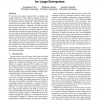Free Online Productivity Tools
i2Speak
i2Symbol
i2OCR
iTex2Img
iWeb2Print
iWeb2Shot
i2Type
iPdf2Split
iPdf2Merge
i2Bopomofo
i2Arabic
i2Style
i2Image
i2PDF
iLatex2Rtf
Sci2ools
103
click to vote
TOCS
2011
2011
SEATTLE: A Scalable Ethernet Architecture for Large Enterprises
IP networks today require massive effort to configure and manage. Ethernet is vastly simpler to manage, but does not scale beyond small local area networks. This paper describes an alternative network architecture called SEATTLE that achieves the best of both worlds: The scalability of IP combined with the simplicity of Ethernet. SEATTLE provides plug-and-play functionality via flat addressing, while ensuring scalability and efficiency through shortest-path routing and hash-based resolution of host information. In contrast to previous work on identity-based routing, SEATTLE ensures path predictability and stability, and simplifies network management. We performed a simulation study driven by realworld traffic traces and network topologies, and used Emulab to evaluate a prototype of our design based on the Click and XORP open-source routing platforms. Our experiments show that SEATTLE efficiently handles network failures and host mobility, while reducing control overhead and stat...
Ethernet | Local Area Networks | SEATTLE | TOCS 2011 |
Related Content
| Added | 15 May 2011 |
| Updated | 15 May 2011 |
| Type | Journal |
| Year | 2011 |
| Where | TOCS |
| Authors | Changhoon Kim, Matthew Caesar, Jennifer Rexford |
Comments (0)

